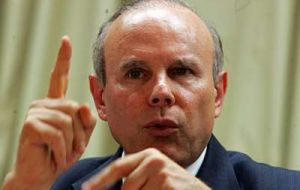MercoPress. South Atlantic News Agency
Brazil freezes budget outlays in an effort to meet its primary surplus target
 Mantega said the freeze will not affect investments for the World Cup
Mantega said the freeze will not affect investments for the World Cup Brazil has frozen 28 billion Reais (approx 13.7 billion dollars) in its 2013 budget as it tries to meet its primary surplus target, Finance Minister Guido Mantega said on Thursday in Brasilia. President Dilma Rousseff’s administration is trying to meet targeted primary surplus goal of 155.9 billion Reais without undermining economic growth.
Mantega said the freeze will not affect items of the budget set aside for investments and hosting the World Cup soccer tournament. The government may increase abatements against this year’s fiscal surplus goal to 45 billion Reais, added Mantega, up from February’s estimate of 25 billion Reais.
The Brazilian government has extended tax cuts and increased spending to spur the economy, even as such measures have helped keep annual inflation near the 6.5% upper limit of the central bank’s target range.
Fiscal policy has remained expansionary, central bank President Alexandre Tombini told lawmakers in Brasilia on Wednesday. According to the latest central bank survey of about 100 economists, the economy is forecast to grow 2.98% this year. The central bank estimates 3.1%.
Mantega anticipated that the government will post a primary surplus this year of 2.3% to 3.1% of GDP, but results will depend on tax revenue, which are not expected to be “extraordinary”.
To meet its 2012 fiscal target the government withdrew 12.4 billion Reais from its wealth fund and discounted 34.9 billion Reais in infrastructure investments from its primary surplus goal.
Mantega also anticipated that the payroll tax on bus fares will be eliminated. The change in the so-called PIS/Cofins tax will be announced through a provisional measure by President Rousseff in coming days.
Bus fares in Sao Paulo, the country’s largest city are scheduled to increase by 6.7% in June to approx 1.56 US dollar.
The measure is part of the government’s effort to contain stubbornly high inflation which remains at the top end of the government’s target, 6.6%.




Top Comments
Disclaimer & comment rules-

-

-

Read all commentsI wonder how much all the giveaways to the cane sugar industry for ethanol production, the subsidies to Uncle Tom Cobley and all have added up to?
May 23rd, 2013 - 09:14 pm 0Any guesses because Matenga won’t know “The Brazilian government has extended tax cuts and increased spending to spur the economy, even as such measures have helped keep annual inflation near the 6.5% upper limit of the central bank’s target range.” And this is a surprise?
I have been told that Dilma does not favour the usual way of running an economy. OK that is her decision, but could she put some thought into WHAT they should do because Mantega is incapable of doing so and it is one of the reasons International Investment Companies are keeping their money elsewhere.
It amazes me that the Finance Minister is always shocked when the money that is given in subsidies and or tax breaks IS SPENT! Just what else are people going to do with it. Even investment in plant and machinery is inflationary if it is additional money.
Chris,
May 23rd, 2013 - 10:40 pm 02011 - IED = 65 billions USD
2012 - IED = 66 billion USD
IED is the true money - fixed investment
Prime rate 2011 - 12,75%
Prime rate 2012 - 7,25%
Brasil spending less money=123,9 billions USD/Year
Our market is strong, workers have money to buy (cars, houses, services, etc)
2 Brasileiro
May 24th, 2013 - 01:12 pm 0Thank you for those figures, but they back up my concerns. Please look at my final paragraph: the people have more money to spend because the government is subsidizing auto makers and the loans to buy them are cheaper -this means MORE money in the economy as a result.
Now it seems that people spending this money (and who can blame them?) is an utter surprise to the government!
There is an old saying in the UK: “you cannot have your cake and eat it” which is just what this finance 'programme' is doing. I am not saying this is wrong but I am amazed that no-one saw it coming. :o)
Commenting for this story is now closed.
If you have a Facebook account, become a fan and comment on our Facebook Page!